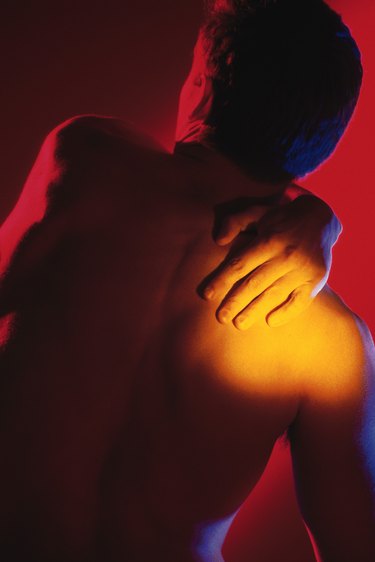
Weightlifters experiencing post-workout tingling and numbness in the shoulder may be experiencing a temporary condition caused by placing too much pressure on nerves. Modifying your execution of specific exercises may eliminate this sensation, as may warming up and stretching properly prior to your workout session. However, if tingling and numbness continue, another underlying cause could be at play and you should consult your doctor.
Brachial Plexus Injury
Video of the Day
The brachial plexus is a neural network transmitting spinal-cord signals to the hands, arms and shoulders. When injured, these nerves produce symptoms such as tingling, numbness, arm weakness and reduced muscle control. Tearing or abnormal stretching of the brachial plexus usually results from a sudden and contradictory shoulder/head movement. The most common type of brachial plexus injury occurring to athletes is called neuropraxia, or stretch injury, according to the National Institute of Neurological Disorders and Stroke — a mild form of BP damage that inhibits signal conduction but does not affect the underlying nerves. Treatment consists of resting the shoulder and arm for two to three weeks.
Video of the Day
Pinched Nerve
Compressed nerves resulting from lifting weights incorrectly or lifting weights that are too heavy may cause tingling and numbness in the shoulders. Rotator cuff tendinitis produces shoulder impingement that can pinch shoulder nerves, too. Military presses are a common cause of pinched nerves, as are dips and other rigorous shoulder exercises capable of stressing nerves. Muscle twitching and difficulty in raising the arms is another symptom of a pinched shoulder nerve. If symptoms do not disappear after avoiding exercise for several weeks, visit a doctor to rule out other possible medical conditions.
Dislocated Shoulder
Shoulder dislocations occur when the upper arm bone is dislodged from the shoulder blade socket due to a forceful and abrupt movement, such as pulling something extremely heavy or being struck violently against the shoulder. In addition to numbness or tingling, pain, swelling and extreme joint stiffness may occur when a shoulder is dislocated or separated. Muscle spasms may increase pain due to nerve disruption. You should see a doctor immediately if you suspect shoulder numbness and tingling is the result of a dislocated shoulder.
Treatment for Pinched Nerves
Treatment generally consists of rest and immobilization until numbness and tingling is gone and full strength returns to the shoulders and arms. An arm brace or sling may be necessary if the nerve injury is in a specific location. A physician will recommend a treatment program or rehabilitation exercises if necessary to facilitate healing. For pain, analgesics or injections of cortisone may help reduce inflammation until the nerve repairs itself.